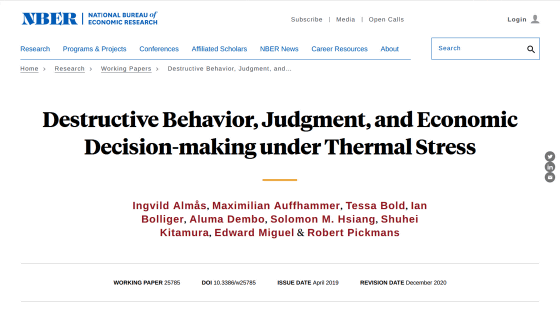Does extreme heat increase people's aggression?

In recent years, the number of hot days has increased around the world due to climate change, and July 2023 has become the '
Destructive Behavior, Judgment, and Economic Decision-making under Thermal Stress | NBER
https://www.nber.org/papers/w25785

Hot weather could boost aggression — but only in certain conditions | Live Science
https://www.livescience.com/human-behavior/hot-weather-could-boost-aggression-but-only-in-certain-conditions
As global warming due to greenhouse gas emissions becomes a problem, rising temperatures are attracting attention not only to the deterioration of people's health but also to their behavior and emotions. Past research has shown that `` suicide rates increase as the temperature rises' ' , ``mental health is more likely to worsen as hot days continue'', and ``hate speech on social media increases when it's too hot or too cold''. It has been reported.
When it's too hot or too cold, ``hate speech on the internet'' increases - GIGAZINE

However, most studies on the effects of heat on people's psychology have been conducted with relatively small sample sizes. Therefore, a research team including the National Bureau of Economic Research conducted an experiment on about 900 subjects living in Berkeley, California, and about 1000 subjects living in Nairobi, Kenya. 'We thought this was an important research topic given the climate change and temperature changes that are occurring around the world,' said study co-author Robert Pickmans, a doctoral student at the University of California, Berkeley. says.
First, the researchers placed subjects in a room at 22 degrees Celsius or 30 degrees Celsius and administered standard tests of decision-making and cognitive tests. The research team compared these results and analyzed how room temperature affected the subjects' decision-making and cognition.

The analysis found that participants who were placed in the hot room reported feeling more sleepy, but there were no significant differences in decision-making or cognitive performance. However, it was confirmed that heat affected subjects' decision-making in a task called ``joy of destruction.''
In ``joy of destruction,'' subjects can choose ``whether to reduce the reward another subject receives.'' Subjects received no benefit or risk in making their choices, and were not informed of the decisions made by other subjects. In other words, the subject's motivation to reduce other people's rewards was simply ``whether or not they wanted to harass other subjects.''
In this task conducted to measure aggression, participants living in Berkeley were unaffected by the heat of the room, while participants living in Nairobi were more likely to harass someone if they entered a hot room. became. Further investigation revealed that the subjects who became more aggressive in the hot room belonged to an ethnic group that was marginalized in the elections held in Kenya at the time.
Mr. Pickmans commented to the scientific media Live Science, ``This result was very interesting considering the literature documenting the relationship between temperature and political violence.'' However, this study was not originally intended to find differences between ethnic groups, so the results should be considered exploratory only.
In addition, Mr. Pickmans and his colleagues are continuing to research the effects of heat on people's psychology and behavior, and are conducting various tests by leaving people in a room at 30 degrees Celsius for two hours. At the time of writing, it has not been confirmed that staying in a hot room significantly impairs cognitive ability, but there is some decline in certain types of reasoning and impulsivity control.

Related Posts:
in Science, Posted by log1h_ik






